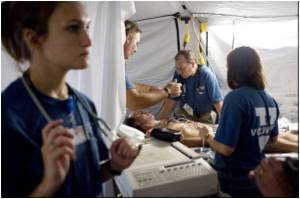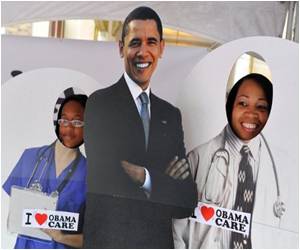Of the 15 million young adults, an estimated 7.8 million who were enrolled in a parent's health plan last year likely would not have been eligible for this coverage without the health reform law's dependent coverage provision.

The survey of adults ages 19 to 29 found that when offered health insurance benefits through an employer, two-thirds (67%) took the coverage. For those who did not enroll in an employer health plan, the chief reasons given were that they were covered by a parent, spouse, or partner (54%) or that they couldn't afford the premiums (22%). Only 5 percent turned down coverage because they felt they didn't need insurance.
"There is a stereotype that young adults believe they are 'invincible' and don't want or need health insurance," said Commonwealth Fund vice president Sara Collins, the study's lead author. "This survey shows that is a myth—a typical uninsured young adult is from a low- or middle-income family and works a low-wage job. In general, young adults value health insurance but cannot afford it." Stressing the importance of outreach and education to ensure that people are aware of the reform law's benefits, the authors note that as young adults and their families became aware of the provision allowing them to remain on their families' insurance policies, uptake increased, from 13.7 million enrolled young adults in November 2011 to 15 million in March 2013.
Low- and Middle-Income Young Adults Most at Risk According to the report, while the number of uninsured young adults dropped from 18.1 million in 2011 to 15.7 million in 2013, those who remained uninsured were overwhelmingly low or middle income.
Eighty-two percent of young adults who were uninsured for a time in 2013 lived in low- or middle-income households and would be eligible for subsidized insurance through the marketplaces or through Medicaid. These young adults are at risk of remaining uninsured for two reasons: lack of awareness about the marketplaces, or residence in a state that is not planning to expand Medicaid eligibility.
The report finds that young adults who would benefit most from the health insurance marketplaces―those without coverage and those from low- or middle-income households―are the least likely to be aware of them. Just 19 percent of young adults who had been uninsured during the year and 18 percent of low-income young adults were aware of the marketplaces.
Advertisement
According to the survey, nearly 30 percent of young adults who spent a time uninsured during the year were in families with incomes under 100 percent of poverty. "The Affordable Care Act has the potential to expand health insurance coverage to millions of low- and middle-income young adults, who have continually struggled to afford the health insurance they need," said Commonwealth Fund president David Blumenthal, M.D. "Ensuring that all Americans are able to take advantage of the Affordable Care Act would require that states expand Medicaid and dedicate sufficient resources to educate their populations about the law's new coverage options."
Advertisement
- Young adults who said their party affiliation was Republican joined parents' policies in greater numbers than those who said their party affiliation was Democratic.
In March 2013, 63 percent of young adults who considered themselves Republicans had enrolled in a parent's health plan in the last 12 months, compared to 45 percent of those who considered themselves Democrats. - For millions of young adults, college graduation is no longer a stepping stone to being uninsured. In March 2013, enrollment in a parent's policy among young adults ages 23 to 25 rose to 36 percent, up from 26 percent in November 2011.
In 2013, 29 percent of young adults who graduated from or left college were uninsured or lost their health insurance, down from 35 percent in 2011. - Education level made a difference in awareness of the marketplaces. One-third of college graduates were aware of the marketplaces, compared to 20 percent of those with a high school degree or less.
Source-Eurekalert








